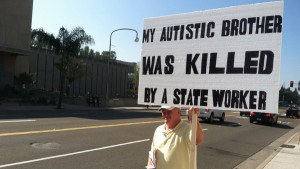More recently, the department has censored records detailing a 2009 homicide at the Fairview Developmental Center and stun gun assaultsagainst a dozen patients at the Sonoma Developmental Center last year.

The Department of Public Health contended that because medical services provided to the developmentally disabled are considered confidential, the reports had to be “aggressively redacted” before disclosure, lawyers for the state wrote.
Judge Timothy Frawley dismissed that reasoning in the order.
“Under (the department’s) construction, redacting factual information from the citation, the public knows a violation has occurred, but cannot ascertain how the violation occurred, whether it has been corrected, or whether it is likely to be repeated,” Frawley wrote. “The purpose of making the citation public is defeated.”
Lawyers for the Department of Public Health argued that two laws, the Lanterman-Petris-Short Act and Lanterman Developmental Disabilities Service Act, both prohibit release of information pertaining to services to center patients. Meanwhile, another law, the Long Term Care Act mandates that facilities post citations in a public place.
Frawley decided the public’s right to know about abuse within state institutions outweighs laws making such information confidential. In the order, he wrote, “the Legislature already has made the determination that disclosure of the citations does not constitute an unwarranted invasion of personal privacy.”
The reports detail incidents in which the centers did not protect patients from harm, failed to provide competent medical care or violated patients' rights. They do not include the names of patients or employees.
The department has 20 days to appeal the ruling or comply by releasing the complete citations; only patient names can be removed.
In a prepared statement today, the Department of Public Health said it “is in the process of evaluating the court’s ruling.”
Robert Rosenthal, CIR's executive director, said the ruling means critical information will be released that will serve "the public interest and help insure that some of the most vulnerable people in our society will be protected and treated in an appropriate manner."
Duffy Carolan, of the law firm Davis Wright Tremaine, represented CIR in the lawsuit.
Information about developmental center violations has historically been hard to get. Oftentimes, even relatives of patients injured or killed at the facilities have been blocked from obtaining details. The Department of Public Health frequently censors reports it provides to Disability Rights California, a protection organization with legal rights to patient records.
In a series of stories this year, California Watch has reported that an in-house police force at the state’s institutions routinely fails to conduct basic police work, even when patients die under mysterious circumstances. In case after case, detectives and officers have delayed interviews with witnesses or suspects – if they have conducted interviews at all.
The force, called the Office of Protective Services, has also waited too long to collect evidence or secure crime scenes and has been accused of going easy on co-workers who care for the disabled.
The Department of Public Health licenses and regulates the centers. Another state agency, the Department of Developmental Services, operates the centers and oversees the police.
State officials have pledged to upgrade criminal investigations and to better protect patients from abuse and neglect. However, the public has not been able to see the full scope of violations documented at the centers.

